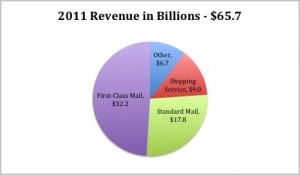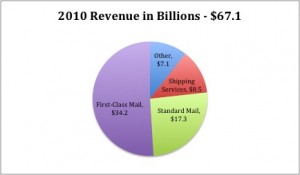WASHINGTON — The Postal Service announced Tuesday it lost $5.1 billion in fiscal 2011, a sign that congressional action cannot wait, said Rep. Darrell Issa, R-Calif.
That loss does not include the mandated $5.5 billion to pre-fund retiree health benefits — which if added in would more than double the net loss.
“The Postal Service faces insolvency because it has not cut its expenses in line with its declining revenue,” Issa, the chairman of the House Oversight and Government Reform Committee said in a statement to the Union-Tribune.
The benefits pre-funding payment, which was previously postponed, is due Friday, and unless legislation is enacted, the Postal Service will default. Chief Financial Officer Joe Corbett also said the Postal Service will not be able to make the $5.6 million benefits payment due in 2012, and, if legislation is not enacted, will run out of cash next year.
“Today’s report further underscores the fact that real reform is needed now, not two years from now, if we are to save the Postal Service,” Issa said.
In his opening statement at last month’s markup of the Postal Reform Act of 2011, Issa said regardless of whether or not changes to retirement could mitigate losses, revenue is down and must be addressed.
“To save the Postal Service we must allow it to right-size it’s infrastructure, to support the needs of the 21st century. Additionally, failing to act will not save the post office, it will doom the post office,” he said at the markup.
Issa introduced the bill in June, and it is headed to the House floor. Thursday, the Senate Homeland Security and Governmental Affairs Committee voted legislation out by 9-1.
Fredric Rolando, president of the National Association of Letter Carriers, said Tuesday the nation’s economy had much to do with the predicament.
“For the first time since the recession began in 2007, this year’s loss was largely driven by the continued impact of the worst recession in 80 years and the effect of Internet technology — above and beyond the crushing and unique burden of the congressional mandate to pre-fund future retiree health benefits,” he said.
Rolando said the pre-fund mandate accounts for 100 percent of the losses over the previous four years. “That does not change what has to be done. Congress must alleviate the pre-funding burden and the Postal Service and its stakeholders must work relentlessly to reinvent the Post Office for the 21st Century. Today we are working with the Postal Service at the bargaining table on doing just that,” he said in a statement to the Union-Tribune.
USPS, the self-supported government entity, which ended its fourth quarter on Sept. 30, announced Tuesday that mail declined by nearly 3 billion pieces from the previous year, at 1.7 percent. But with a reduction of hours, the Postal Service was more efficient this year, Corbett said.
“Indeed our situation is considered dire,” said Lou Giuliano, a USPS board member, pushing for congressional action.
First Class mail service declined by 5.8 percent, a trend attributed to electronic migration and the decline in economy. In 2010, First Class Mail had revenue of $34.2 billion, but in 2011 that had dropped to $32.2 billion.
Corbett said that since a 2006 peak of 213 billion pieces of First-Class Mail, the volume has declined each year, which “underscores the need to streamline our infrastructure and make changes to our business model.”
Despite a difficult financial situation, the Postal Service did show growth from 2010 to 2011. Shipping services, including priority and express mail, revenue increased by $530 million, or 6.3 percent. Standard Mail also increased by $495 million or 2.9 percent, and 2 billion more pieces of mail were sent via Standard Mail, an increase of 2.6 percent.
“The Postal Service can become profitable again if Congress passes comprehensive legislation to provide us with a more flexible business model so we can respond to a changing marketplace,” Said Postmaster General and CEO Patrick Donahoe.
In 2011, USPS reduced work hours by 34 million, while delivering to 636,500 more locations. This continues a decade-long trend. The Postal Service has reduced work hours by 28 percent since 2001. “Right now the business model is broken, so we’re kind of swimming upstream,” Corbett said.


